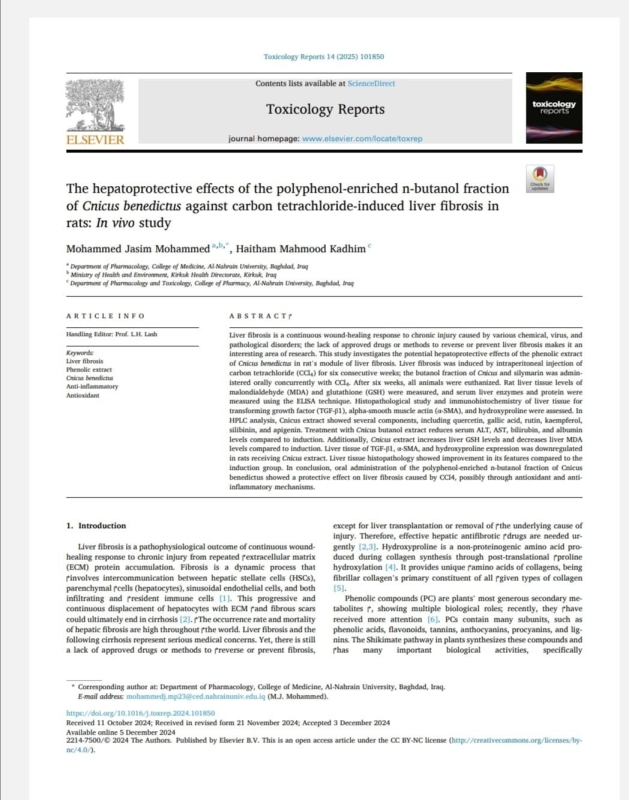
نشر الأستاذ الدكتور هيثم محمود كاظم، رئيس فرع الأدوية والسموم في كلية الصيدلة بجامعة النهرين، بحثاً علمياً في مجلة Toxicology Reports التي تصدر عن دار النشر العالمية Elsevier. تناول البحث التأثيرات الوقائية للجزء الغني بالبوليفينول من مستخلص نبات Cnicus benedictus (الشوك المبارك) ضد التليف الكبدي الناتج عن التعرض لمادة الكربون رباعي الكلور (CCl4) في الفئران، مع تسليط الضوء على الخصائص المضادة للأكسدة والالتهابات لهذا المستخلص النباتي.
هدف البحث إلى تقييم فعالية المركبات النشطة في مستخلص الشوك المبارك في التخفيف من تأثيرات التليف الكبدي، حيث تم تحليل تركيبته الكيميائية باستخدام تقنية HPLC. وأظهرت النتائج احتواء المستخلص على مركبات بوليفينولية فعالة، مثل الكيرسيتين، الروتين، حمض الجاليك، الكايمبفيرول، والأبيجينين. كما تناولت الدراسة تأثير المستخلص على تقليل الإجهاد التأكسدي من خلال رفع مستويات الجلوتاثيون (GSH) وخفض المالونديهايد (MDA) في أنسجة الكبد.
وأظهرت النتائج قدرة المستخلص على تقليل الالتهابات من خلال تقليل التعبير الجيني لعوامل التليف مثل TGF-β1 وα-SMA. كما أسفرت الدراسة عن تحسين ملحوظ في البنية النسيجية للكبد وتقليل التليف في المجموعات المعالجة بالمستخلص مقارنة بالمجموعات المصابة.
تعد هذه الدراسة خطوة مهمة في استكشاف الفوائد الطبية لمستخلص الشوك المبارك، مما يفتح آفاقاً جديدة لاستخدامه كعلاج وقائي في مجال أمراض الكبد.
قسم الإعلام والاتصال الحكومي
رئاسة جامعة النهرين
Faculty Member from Al-Nahrain University Publishes Study on the Protective Effects of Blessed Thistle Extract Against Liver Fibrosis
Professor Dr. Haitham Mahmoud Kazem, Head of the Department of Pharmacology and Toxicology at the College of Pharmacy, Al-Nahrain University, has published a scientific study in the Toxicology Reports journal, issued by the global publisher Elsevier. The study explored the protective effects of the polyphenol-rich fraction of Cnicus benedictus (Blessed Thistle) extract against liver fibrosis induced by carbon tetrachloride (CCl4) in mice, with a focus on the antioxidant and anti-inflammatory properties of this plant extract.
The study aimed to evaluate the efficacy of active compounds in Blessed Thistle extract in mitigating the effects of liver fibrosis. The chemical composition of the extract was analyzed using HPLC, revealing the presence of active polyphenolic compounds such as quercetin, rutin, gallic acid, kaempferol, and apigenin. The research also examined the extract’s ability to reduce oxidative stress by increasing glutathione (GSH) levels and decreasing malondialdehyde (MDA) levels in liver tissues.
The findings demonstrated the extract’s potential to reduce inflammation by downregulating the expression of fibrotic markers such as TGF-β1 and α-SMA. The study also showed significant improvement in liver tissue structure and reduced fibrosis in the groups treated with the extract compared to the affected groups.
This study represents an important step in exploring the medicinal benefits of Blessed Thistle extract, paving the way for its potential use as a preventive treatment in liver diseases.
Department of Media and Government Communication
Al-Nahrain University Presidency
